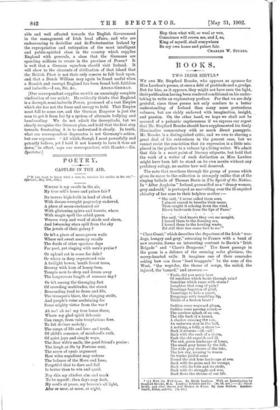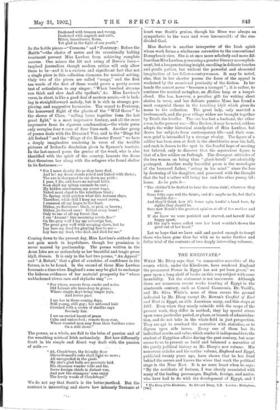BOOKS.
TWO IRISH SIBYLS.* She said, ' God knows they owe me nought, I tossed them to the foaming sea, I tossed them to the howling waste, Yet still their love comes back to me.'"
" Clare Coast," which describes the departure of the Irish " war- dogs, hungry and grey," returning to France with a hand of new recruits, forms an interesting contrast to Davis's "Irish Brigade" and " Clare's Dragoons." The finest passage in the poem is a defence of the seeming miles gloriosus, the merry-hearted exile. It imagines one of their comrades asking how can these " loud braggarts " be the sons of the West, "the wept-for, the theme of songs, the exiled, the injured, the banned," and answers :- " Fools, did you never hear
Of sunshine which broke through rain ? Sunshine which came with storm ?
Laughter that rang of pain ? Boastings begotten of grief, Vauntings to hide a smart, Braggings with trembling lip, Tricks of a broken heart ?
Sudden some wayward gleam, Sudden some passing sound,— The careless splash of an oar, The idle bark of a hound, A shadow crossing the sun, An unknown step in the hall, A nothing, a folly, a straw !- Back it returns—all—all !
Back with the rush of a storm, Back the old anguish and ill, The sad, green landscape of home, The small grey house by the hill, The wide grey shores of the lake, The low sky, seeming to weave Its tender pitiful arms Round the sick lone landscape at eve.
Back with its pains and its wrongs, Back with its toils and its strife, Back with its struggle and woe, Back flows the stream of our life.
• (1.) With the Wild Geese. By Emily Lawless. With an Introduction by Stopford Brooke, M.A. London s Ishister and Co. [4s. 6d. net.]—(2.) Ghost- Bereft, and other Stories and Studies in Verse. By Jane Barlow., London: Smith, Elder, and Co, [3s. 431. I WE owe Mt. Stopford Brooke, who appears as sponsor for Miss Lawless's poems, at once a debt of gratitude and a grudge. But for him, as it appears, they might not have seen the light,
their publication having been rendered conditional on his under- taking to write an explanatory preface. For that we are duly grateful, since these poems not only conduce to a better understanding of Ireland than many more pretentious volumes, but are richly endowed with imagination, insight, _- and passion. On the other hand, we hope we shall not be accused of a pedantic captiousness if we express our regret that Mr. Stopford Brooke should have supplemented his finely illuminative commentary with so much direct panegyric.
Mr. Brooke is a distinguished critic, and we own to sharing a great deal of his enthusiasm in the present case, but we cannot resist the conviction that its expression is a little mis- placed in the preface to a volume by a living writer. We admit that this is a moot point of literary etiquette, but hold that the work of a writer of such distinction as Miss Lawless might have been left to stand on its own merits without any prefatory eulogy, no matter how well deserved.
The note that re-echoes through the group of poems which gives its name to the collection is strangely unlike that of the ringing ballads of Thomas Davis in The Spirit of the Nation.
In " After Aughrim " Ireland, personified as a " dreary woman, grey and cold," is portrayed as marvelling over the ill-requited chivalry of her sons to their helpless mother:— "She said, I never called them sons, I almost ceased to breathe their name, Then caught it echoing down the wind, Blown backwards from the lips of Fame.'
Darkened with treason and wrong, Darkened with anguish and ruth, Bitter, tumultuous, fierce,
Yet glad in the light of our youth."
In the battle pieces—" Cremona " and " Fontenoy : Before the Battle"—the choice of metre and its occasionally halting treatment prevent Miss Lawless from achieving complete success. One misses the lilt and swing of Davis's lines—
inspired journalism though modern critics will only allow them to be —and it is a curious and significant fact that not a single piece in this collection clamours for musical setting.
Only two of the pieces are called "songs," and the fiat ten words of the first of these would prove a pretty severe test of articulation to any singer: "When beached streams run thick and slow And efts upclimb," 8c. Miss Lawless's verse, in short, is like a good deal of• modern music,—it is lack- ing in straightforward melody, but it is rich in strange, per- plexing, and suggestive harmonies. The sequel to Fontenoy, the homeward flight of the ghosts of the " Wild Geese" to the shores of Clare, " sailing home together from the last great fight," is a most impressive fantasy, and all the more impressive from its rigorous condensation,—the whole poem only occupies four v3rses of four lines each. Another group of poems deals with the Desmond War, and in the "Dirge for" All Ireland " and the " Dirge of the Munster Forest " we have a deeply imaginative rendering in verse of the terrible pictures of Ireland's desolation given in Spenser's tractate. In the last-named poem the genius of the wood, who is also identified with the spirit of the country, laments the doom that threatens her along with the refugees who found shelter in its fastnesses :—
" For I must shortly die as they have died,
And lo ! my doom stands yoked and linked with theirs; The axe is sharpened to cut down my pride :
I pass, I die, and leave no natural heirs.
Soon shall my sylvan coronals be cast ; My hidden sanctuaries, my secret-ways, Naked must stand to the rebellious blast; No Spring shall quicken what this Autumn slays.
Therefore, while still I keep my russet crown, I summon all my lieges to the feast.
Hither, ye flutterers !.black, or pied, or brown ; Hither, ye furred ones I Hither every beast !
Only to one of all my forest clan I cry Avaunt! Our mourning revels flee !'
On the grey wolf I lay my sovereign ban, The great grey wolf with serapilT claws, lest ho
Lay bare my dead for gloating foes to see—
Lay bare my dead, who died, and died for me."
Coming down to the present day, Miss Lawless's outlook does not gain much in hopefulness, though her pessimism is never marred by partisanship. The poems written in the
Aran Isles are as melancholy as her beautiful and tragic prose idyll, Grania. It is only in the last two poems, " An Appeal " and "A Retort," that a glint of sunshine, of confidence in the future, is to be found. In the second of these. Miss Lawless
forecasts a time when England's sons may be glad to exchange the hideous evidences of her material prosperity for " where unblackened rivers race and skylarks sing
"For where, remote from smoke and noise, Old Leisure sits knee-deep in grass; Where simple days bring simple joys, And lovers pass.
I see her in those coming days, Still young, still gay; her unbound hair Crowned with a crown of starlike rays Serenely fair.
I see an envied haunt of peace
Calm and untouched; remote from roar,
Where wearied 131Q11 may from their burdens cease On a still shore."
The poems, as a whole, are full to the brim of passion and of the wreathing mists of Irish melancholy. But how differently Scott in his simple and direct way dealt with the passion of exile :—
" Ah, Clandeboye, thy friendly floor Slieve-Donard's oaks shall light no more ; All unregarded in the glade My sire's glad halls are prostrate laid. His clansmen wander wide and far, Serve foreign chiefs in distant war, And now the strangers' sons enjoy The lovely woods of Clandeboye."
We do not say that Scott's is the better tmethod. But the contrast is interesting, and shows how intensely Teutonic at
heart was Scott's genius, though his Muse was always so sympathetic to the wars and woes innumerabb of the sea- divided Gael.
Miss Barlow is another interpreter of the Irish spirit whose work forms a wholesome corrective to the conventional Donnybrook view. She is at once more scholarly and more dif- fuse than Miss Lawless, possessing a greater literary accomplish- ment, but a less penetrating insight, excelling in delicate touches and gentle pathos, but without the powerful and elemental imagination of her fellow-countrywoman. It may be noted, also, that in her shorter poems the force of the appeal is weakened by the occasional preciosity of the diction. In her bands the sonnet never "becomes a trumpet "; it is rather, to continue the musical metaphor, an .Eolian harp or a harpsi- chord. She has, however, a peculiar gift for writing short
stories in verse, and her delicate pensive Muse has found a most congenial theme in the touching idyll which gives its
name to the collection. The great lady, only married a twelvemonth, and the poor village widow are brought together by Death the leveller. The one has lost a husband, the other a son, in the present war—Miss Barlow, it may be noted, seldom adopts the wider historical standpoint of Miss Lawless, but draws her subjects from contemporary life—and their com- mon grief is intensified by a strange rivalry. The figure of a soldier has been seen at dusk in the shrubberies near the hall, and each is drawn to the spot in the fearful hope of meeting her beloved, only to discover that the mysterious figure is that of a live soldier on furlough. The divergent attitudes of the two women on being thus " ghost-bereft " are admirably portrayed. Another really beautiful poem is the monologue of the bereaved father, " astray in his mind " since the loss by drowning of his daughter, and possessed with the thought that the bad w3ather will bring her and the other young folk home. As he puts it-
" The childer'll be fretted to hear the storm risin', wherever they are— Some folks says wid the Saints, and it's maybe no lie, but that's terrible far—
And they'll think how it's home agin, lendin' a hand here, by rights they should be. Sure now Norah's the greatest opinion at all of her mother and me; If she knew we were perished and starved, and herself livin' happy apart, All the say's waves rolled over her head wouldn't drown the grief out of her heart."
Let us hope that we have said and quoted enough to tempt those who have gone thus far with us to make further and fuller trial of the contents of two deeply interesting volumes.











































 Previous page
Previous page